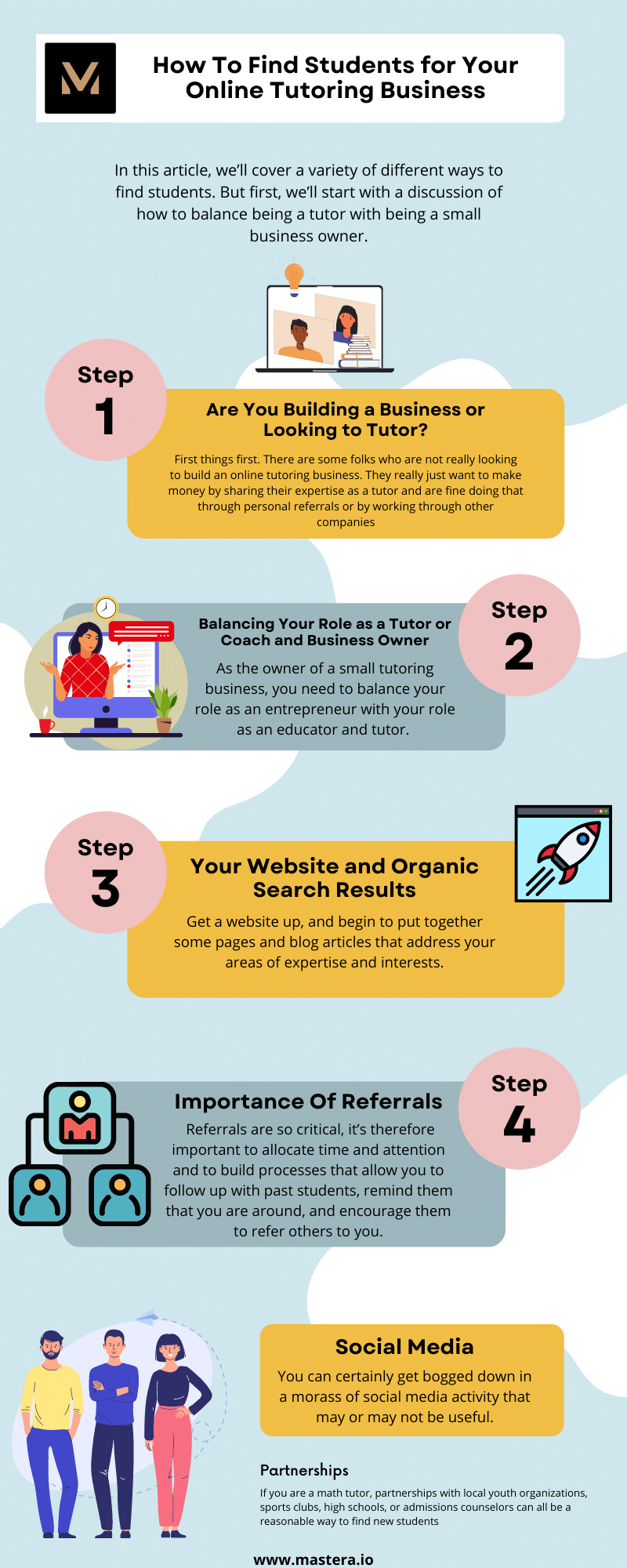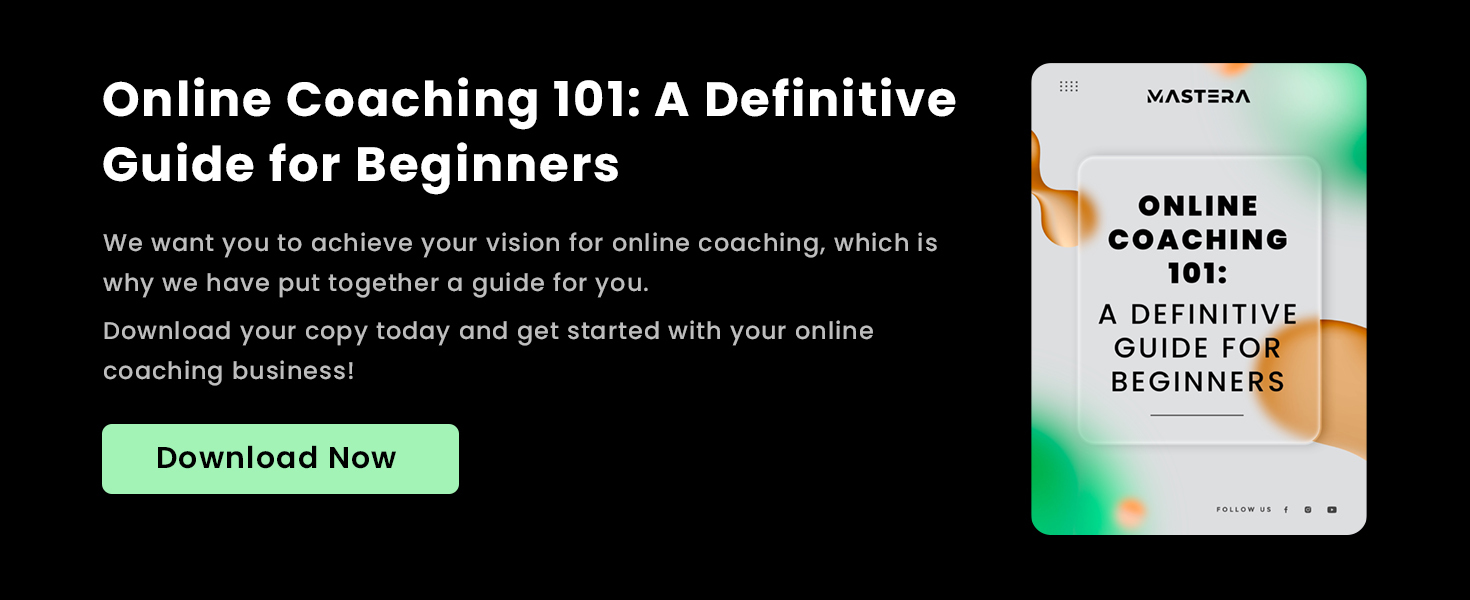Any successful entrepreneur must balance working “in” their business with working “on” their business. As a tutor, this means you need to spend a lot of time tutoring students, of course. But you also need to spend time setting up systems and processes to attract and manage future students. When you are just starting out as a private in-person or online tutor or academic coach and looking to build a small business (or a large one), growing your roster of students is obviously critically important. You can’t get referrals for additional students without current students!
But even in the beginning, before you have very many students at all, you should seek to attract new students in ways that build your tutoring business for long-term success. You’ll want to avoid the “boom and bust” cycle of being really busy one month and much less so the next.
In this article, we’ll cover a variety of different ways to find students. But first, we’ll start with a discussion of how to balance being a tutor with being a small business owner.
Are You Building a Business or Looking to Tutor?
First things first. There are some folks who are not really looking to build an online tutoring business. They really just want to make money by sharing their expertise as a tutor and are fine doing that through personal referrals or by working through other companies. If that’s you, no problem. Much of this article will still apply to you, but some of it will not.
So, let’s assume you are a physics and math tutor, and you want to earn extra money by leveraging these skills. The idea of owning a company, setting up a website, dealing with marketing, accounting, etc. does not appeal to you at all. You are fine with someone else doing these things for you. In this case, you should focus on the following parts of this article:
- Importance of referrals
- Popular review sites
- Tutor matching websites
- Tutoring agencies
These parts of the article will all provide solid ideas for finding students to tutor. If you are thinking more broadly about building an online tutoring business, then this entire article is relevant to you (including the sections mentioned above).
Balancing Your Role as a Tutor or Coach and Business Owner
As the owner of a small tutoring business, you need to balance your role as an entrepreneur with your role as an educator and tutor. Sitting down and tutoring students is working “in” your business. Designing a website, choosing an accounting system, creating a process for following up with students, and creating online profiles to attract new students are all examples of working “on” your business.
If you don’t think deeply about your dual role as a tutor and an entrepreneur, you may still enjoy early success if you are an experienced in-person or online tutor. In the tutoring and coaching business, referrals are generally a huge portion of any tutor’s new leads. So, you may already be getting lots of new students contacting you.
That could mean your schedule is always full, which seems great. But you may then ask yourself, am I charging enough? Are good leads being turned away because my schedule doesn’t have any openings? These are “good” problems, but they can still be problems, because the result is you leaving money on the table or being more stressed than you need to be.
If all goes well, you may find yourself facing some important decisions rather quickly. If you are getting a lot of different student requests from various sources, which leads do you pursue? Do you raise your prices, or consider working with other tutors and referring students to them? Having well designed business processes and a “company” and “brand” built up will put you in a better position to address these types of questions.
For these reasons, as we move on in this article about how to find students for your online tutoring business, we will methodically move through various elements of a tried-and-true process for building your online tutoring business that allows you to balance working in and on your tutoring business.
The above image can be considered an online tutoring business marketing pyramid of sorts. The items in dark blue are the most critical. They help you build your business, find students, and build your personal or company brand. They typically have a very high return on investment. They are the foundation for finding new students on an ongoing basis.
The shade of blue above that may not even be necessary to access or address in some cases. It tends to take more time and money to get those activities right and ensure you aren’t wasting your time and money. However, they are paths to finding students and building your brand.
The lightest shade of blue is interesting. If you aren’t as concerned with building an increasingly large business, and just want to earn some extra money from tutoring on the side, these can be extremely important vehicles for acquiring students. A great feature of working with a tutoring agency (like mine) or a tutor matching website (like Wyzant) is that it’s a direct way to acquire students to work with. You’ll put up a profile sharing your expertise, and you’ll be contacted directly. It won’t cost any money (typically) upfront to be a part of this process. You’ll get to set your hourly rate as well. The two big downsides are a) the company will keep a margin of between 20% and 60% on whatever the student is paying to be tutored by you and b) the student remains the “company’s student,” not yours. So you can’t really expect to generate future referrals from that particular relationship.
But let’s step back and work our way through this pyramid, offering some specific examples, to put you on your way to finding new students for your online tutoring business.
Your Website and Organic Search Results
If you are looking to build an online tutoring business (vs. just find ways to fill your schedule with student tutor), one of the first things you should do is create a website. This will be your foundation and where people will come to learn about you and request more info. There are many options for doing this. Mastera.io offers web-site building capabilities. Squarespace, Wix, Hubspot, and Wordpress are all options.
We won’t go into an extended discussion of pros and cons of various website options in this article. But here are a few quick thoughts. First, in 2021, with the aggressive shift to online learning that has occurred, being able to offer online tutoring on your site or at least explain how it integrates with your site is important. Second, if you are building a tutoring business, you will soon realize that from accounting systems to time tracking systems to customer relationship management systems (to keep track of your leads) to social media management systems, the number of solutions and applications and websites you are tempted to use is overwhelming. So if you can choose a website provider that integrates many of these features into its solution, you’ll be better off.
Now let’s talk about why it’s so important to set up a website, from any website provider, and put some good content up on it.
The reason it’s important to have a website sooner rather than later is that the earlier you can put up a website, ideally with a blog, the sooner you can begin to generate positive Search Engine Optimization activity. As a new tutor, you’ll be unlikely to rank anytime soon in google search for “tutor in chicago” or “online tutor.”
However, if your site talks about your background, your interests, etc., and that happens to align with someone who searches for “I need an AP physics BC tutor with experience in mechanics”, you could rank surprisingly well for that very specific search term very quickly. So, get a website up, and begin to put together some pages and blog articles that address your areas of expertise and interests. The idea of “SEO optimization” may be the most important way to find students to tutor over time. You’ll find that paid marketing is often very expensive, and a well-designed website optimized for search terms related to what you do is the most efficient way to find new students.
Importance of referrals
It might be obvious to many readers, but most tutors generate the majority of their students through referrals. Referrals are likely to be one of the most important sources of new students as you build your online tutoring business. Of course, if you don’t have a single student yet, it’s hard to get a referral. But even then, simply letting friends and family know you are in the business of tutoring could generate a few referrals. Referrals don’t cost anything, and most people underestimate how powerful it is when someone a person trusts makes a recommendation. When someone calls my tutoring company having already been referred, they often don’t even really care about the price. They are ready to go.
Because referrals are so critical, it’s therefore important to allocate time and attention and to build processes that allow you to follow up with past students, remind them that you are around, and encourage them to refer others to you.
What types of business processes can encourage more referrals?
Email marketing is a simple and powerful way to drive referrals. Sure, there is a small percentage of prior customers who will evangelize for your services without any prodding at all. But that’s rare. Most happy customers could use a reminder that you are around and available. Sending an email once per month to all previous customers with an update on your business and any news is an important marketing activity. Another way to approach email marketing is to set up automatic “drip” campaigns where emails are sent automatically to contacts “X” days or months after they become a customer or a lead. Masters offers a marketing add-on that enables powerful email marketing strategies.
Social Media
You can certainly get bogged down in a morass of social media activity that may or may not be useful. But many website builders, like HubSpot, allow you to automatically post blog articles to social media and easily schedule our posts in advance. It can be made relatively simple.
And if you are tutoring middle school students, you may find that many parents are active on Facebook. So setting up a simple, clean business page and spending an hour a week on it can be a reasonable step towards finding new students to tutor. The same could be said of Twitter, Pinterest, LinkedIn, Instagram, and others. However, when you are just starting out, I would choose one or two that are most aligned with your target audience. You will soon run out of time trying to be active in too many places.
Partnerships
If you are a math tutor, partnerships with local youth organizations, sports clubs, high schools, or admissions counselors can all be a reasonable way to find new students. My company’s focus is 1-1 subject and standardized test prep tutoring, and we built a particularly powerful partnership with a company focused on executive function coaching. Or consider, Next College Student Athlete (NCSA), this organization partners with both athletic leagues and academic support services to help students get college athletic scholarships. The partnerships listed bring benefits and referrals in both directions. Grad School Road Map, a two person admissions consulting service, features trusted partners on the home page of its web-site.
Powerful partnerships can also be formed with other small tutoring companies that focus on other subjects or tests. If you are a math tutor, seek out other small businesses that seem to focus on English or Language Arts tutoring. You may be able to refer students in both directions.
Pay Per Click Advertising
There are now a variety of reasonable ways to pay directly for clicks to your website or business profile. You have probably heard of Google Ads, the most popular form of “pay per click” or PPC advertising. You pay, usually between $2 and $6, for someone to click on an ad which will send them to your website. Yahoo has an ad program, Yelp (which we’ll discuss later) now has an ad program, Facebook and Twitter both offer ad programs, and there are even ads like this on Amazon now.
It tends to be expensive to pay for advertisements like this, and you may need to spend thousands and work with a PPC consultant before you begin to see a positive ROI on this type of activity. But, the traffic you get will be yours, and will help you build your brand.
Other Paid Marketing
If there are popular local organizations in your town or in a niche with which you are familiar, becoming a sponsor or advertiser can offer a path towards finding new students. Unlike PPC advertising, here you would just spend $100 or $500 or $1,000 for your logo or contact info to go up on a website, in a physical magazine or location, and hope that people notice it and call you. Again, this can be expensive, and the returns are uncertain.
Popular review sites
As a private tutor looking to find new students, fully leveraging popular review sites is something I highly commend. Typically, they offer you a profile, with by itself can link back to your website and offer SEO value. They typically allow you to explain your business, and then they collect reviews from your prior customers.
Many, but not all of these, are “local” in nature. The ones we have used with success in the past include:
These sites are not tutoring specific, but tutoring companies and individuals are a clear sub-segment of the universe of active companies on them. Putting profiles on these sites is a recommended initial step to building your online tutoring business and finding students to tutor.
Tutor-Student Matching Websites
If you are not at all interested in building a tutoring business, but just want to tutor, this section is extremely important for you. The websites below all allow you to create a profile and describe yourself and your expertise. Then, they’ll allow you to set a price. They may make you take a little test to confirm your level of expertise. Literally hundreds of thousands of tutors may be listed on these sites. The sites/companies then spend a lot of money on marketing and technology to attract students to their sites so that they can find you. They, in effect, take care of the “business and marketing” stuff so that you can focus on tutoring. Working with them is a reasonable way to find students, but it’s not recommended if you are looking to build your own personal brand outside of the site.
Now, what some tutors will do is spend some time early on creating a profile on these sites, and taking on students, initially at low hourly rates. Over time, they’ll get positive reviews. At that point, the tutor will increase their prices steadily. At some point, they will focus on their own tutoring business, and only take students from the above websites who are willing to pay very high prices. They can then even use their profile and its excellent reviews to market themselves when working with students independently. Craig’s List is another place you can post a very rudimentary profile. It may be worthwhile early on as you try to build up a base of students to try posting there. As a tutor on these sites, you are generally a 1099 independent contractor, free to have a profile on all these sites at once.
Tutoring Agencies
The company I own, MyGuru, is a good example of a tutoring agency. There are many companies like mine out there. We have a small team of tutors that we work with, who are mostly 1099 contractors. We focus on building a small, high quality team. Our tutors are highly vetted. We are not out to build a giant tutoring network so that students can search for a tutor. If you need help with the GMAT, you contact MyGuru, and we eventually introduce you to our best available tutor based on your needs.
So in theory, our tutors can and sometimes are listed on sites like Wyzant. But unlike Wyzant, MyGuru stands behind each of our tutors and ensures they individually reflect the MyGuru brand. We have close personal relationships with each tutor, and we target a 30% margin on the tutoring they do. We do handle the marketing and customer service elements of the tutoring business, so that the tutors can focus on tutoring. However, we do also have more complex relationships with some of our more “business minded” tutors, whereby they can operate their own website and have personal students who they sometimes refer to us when they need help with someone outside their area of expertise.
Other examples of tutoring agencies include Ivy League Tutoring, Educational Endeavors, or Academic Approach. You can google them to see who they seem to operate.
If you are looking to build an online tutoring business, I would recommend building relationships with tutoring companies and agencies who are transparent and comfortable with your interest in building your own roster of students. Just make sure that if you get a student through the agency, you keep referrals from that student running through the agency. Maybe you can even negotiate different rates of pay over time as the relationship with that company grows.
Summary and Conclusion
As you seek new students for your new or growing online tutoring business, you have many options. Most importantly, you need to determine the extent to which you are trying to build a business, or fill your schedule with students to tutor. If it’s the former, seek a balance between working “in” and “on” your business. Leverage the marketing pyramid to allocate the time you spend to creating business profiles and engaging in various types of marketing activities.








